Fall 2016 Newsletter

Family Violence • Domestic Violence • Integrated Domestic Violence • Elder Justice Initiative
Fall 2016 Newsletter |
||
 |
||
Family Violence • Domestic Violence • Integrated Domestic Violence • Elder Justice Initiative |
In This Issue |
||||||
Message from The Hon. Deborah A. Kaplan, Statewide Coordinating Judge for Family Violence Cases |
||
One year ago, I was appointed as the Statewide Coordinating Judge for Family Violence Cases, a position I hold in addition to presiding over a Matrimonial Part in the Supreme Court in New York County. The OFVC works together with the administrative judges and judges who handle family violence issues in our courts across the state, including the domestic violence (DV) courts and integrated domestic violence (IDV) courts, in an effort to refine practices and promote better and more consistent outcomes in these parts. In the past year, my staff and I have met with judges, non-judicial personnel and community stakeholders all around the state to get a better understanding of how these issues are addressed and how my office can be of assistance to the courts. We are currently working on ways to support this important work with relevant educational programs, bench tools and resources on our website for the public as well as judges and their staffs. In this newsletter, we have highlighted some of the many projects and initiatives of the OFVC. In addition to family violence matters, the OFVC is also focused on the critical issue of elder justice. To that end, we are developing programs and protocols to improve how the court system addresses the growing number of cases, both civil and criminal, involving the state’s older population, including allegations of elder abuse. As you will read more about in this newsletter and on our website, I convened an interdisciplinary Elder Justice Working group, which, pursuant to an Administrative Order, is now a standing committee of the courts. The New York State Judicial Committee on Elder Justice has met twice, subcommittees have been created and we are actively working to identify areas in which the court system can better address the needs of older New Yorkers when they come into contact with the courts. One of the most important aspects of the OFVC is the multitude of training we offer our judges and other court personnel on the issues of domestic violence and elder justice. We have held several statewide and regional trainings in the past year and are hard at work planning some very exciting trainings and symposia, which will be listed in the training calendar section of this newsletter. In addition, we produced a recorded continuing legal education (CLE) program on Firearms and Domestic Violence, which will be widely shared with court staff and judges, including Town and Village Courts and is now available on the Judicial Institute website. Further, my office has edited, revised and sent out to each district for dissemination, the Family Court Judicial Guide to Domestic Violence Risk Factors bench card. We plan to also create an elder abuse bench card for all judges which may include definitions of elder abuse, how to recognize abuse and neglect, risk factors and relevant statutes. “One of the most important aspects of the OFVC is the multitude of training we offer our judges and other court personnel on the issues of domestic violence and elder justice.” The Hon. Deborah A. Kaplan, Another exciting OFVC project discussed in this newsletter is the implementation of a recently enacted New York State law that calls for the creation of a pilot program in family court which will allow for the filing of petitions for temporary orders of protection by electronic means and for the issuance of the initial ex parte temporary order of protection by audio visual means. For victims of domestic violence who are in need of an immediate temporary order of protection for whom attendance at court would constitute an undue hardship or for whom traveling to and appearing in court creates risk of harm, the impact of this rule cannot be overstated. My office has identified seven pilot counties for the initial rollout and we are working with court personnel and advocates in those counties to begin the program later this year. In my capacity as Statewide Coordinating Judge, I have had the privilege of presenting at or participating in a number of programs in the last few months, from the Kings County Supreme Court IDV Court 10 Year Anniversary Celebration in October to numerous bar association sponsored CLE programs to the 11th Annual NYC Elder Abuse Conference in June. Finally, the OFVC has developed a new website with pages devoted to domestic violence, integrated domestic violence and elder justice. I believe the public portion of the DV and IDV website is welcoming and accessible. It has useful information including links to services, links to family offense forms and petitions and articles of interest. The site highlights the important work and innovative projects that our courts are engaged in across the state, and we are constantly updating the site with new developments and resources. The Elder Justice portion of the website includes a resource directory for older New Yorkers, which is a fairly comprehensive list of resources throughout the state. The website also provides links to information that may be of help or interest to older New Yorkers, in addition to links to articles of interest. Click here to view the OFVC website: http://www.nycourts.gov/courts/family-violence/index.shtml The OFVC is committed to encouraging continuing innovation and increasing the breadth and depth of support to judges and court personnel in order to respond to critical issues that affect our most vulnerable New Yorkers. I encourage you to read more about the OFVC’s initiatives in this newsletter and on our website. If you have any questions, comments or suggestions for the OFVC please feel free to send us an email at ofvc@nycourts.gov or call us at (646) 386-5540. |
|||
Spotlight on: Kings County IDV Court, a National Mentor Court |
|||
| By Brian Kieran, Esq., Principal Court Attorney, Kings County Criminal Term, IDV Part | |||
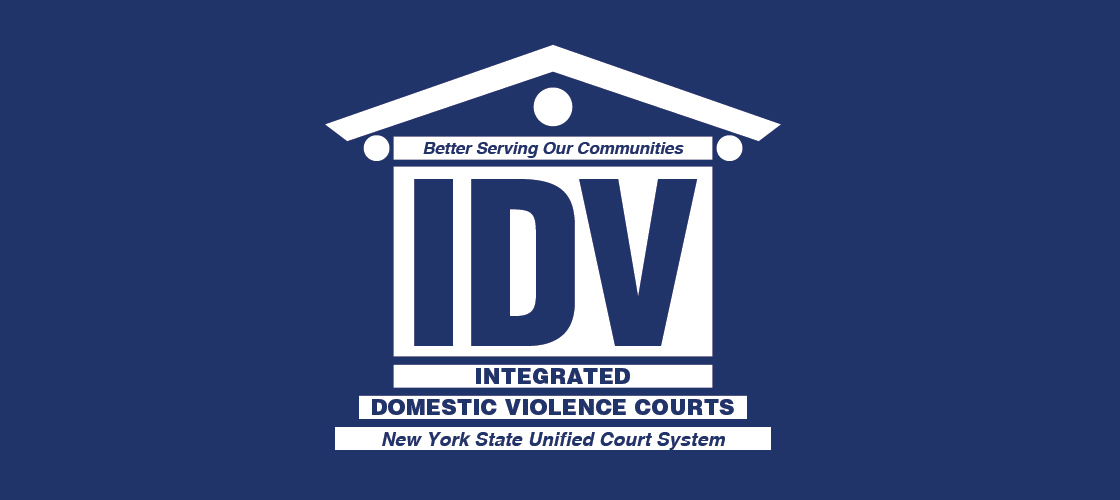 |
|||
| In this newsletter and on our website, the OFVC will periodically highlight the important work of our DV and IDV parts around the state. This newsletter features profiles of the Kings County IDV Court and the Erie County IDV Court.
The IDV “Integrated Domestic Violence Court” is a problem solving court dedicated to a “one family – one judge” model which developed in response to the historic problem of domestic violence victims and their families who were required to appear in different courts before multiple judges, often located in different parts of a county, to address their legal issues in the court system. The IDV Court provides more informed judicial decision making and greater consistency in court orders, while reducing the number of court appearances for litigants. HISTORYIn 2003, Chief Judge Judith Kaye made the implementation of IDV courts a statewide initiative. Systems and protocols were developed and a Model Part opened in Queens County in 2005. The IDV judges and non-judicial staff received and continue to receive training on the relevant, applicable law, and on issues such as cultural competency and implicit bias and other issues. The office of the Statewide Coordinating Judge for Family Violence Cases now oversees the training for IDV judges and non-judicial staff. In 2015, the OFVC held its statewide Judicial Symposium with sessions including: Trauma, Mental Health and High Conflict Separation, Domestic Abuse in Later Life; Fairness and Bias in Domestic Violence Cases. The Kings County IDV Court serves as a National Mentor Court through a program supported by the Department of Justice to assist other jurisdictions to develop their own problem solving domestic violence courts. Since its inception more than 10 years ago, the Kings County IDV Court has served more than 28,000 families. |
|||
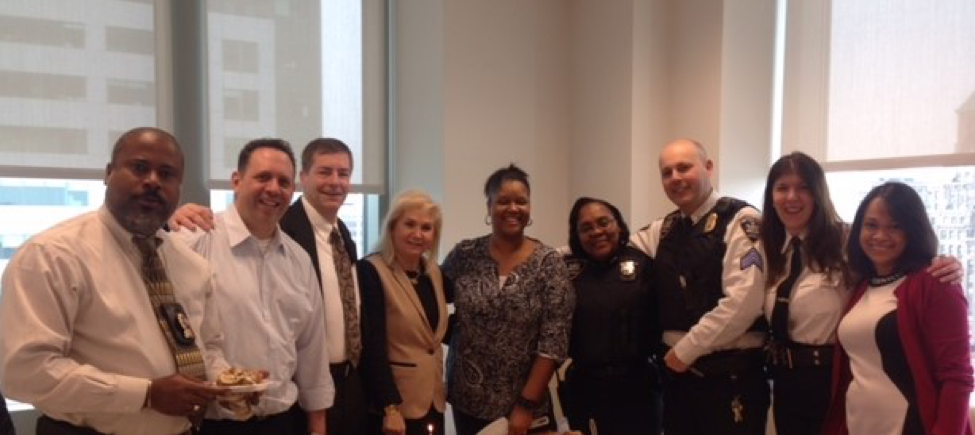 |
|||
| From left to right: Senior Court Clerk Jean-Bernard Surena, Senior Court Clerk Leonard Cohen, Principal Law Clerk Brian Kieran, Justice Esther M. Morgenstern, Senior Court Clerk Jenise Arnao-Plenty, Court Officer Sabrina Hamlin, Sgt. Sal DiDonna, Sgt. Christine Pagano, Resource Coordinator Martha Velasquez. Not pictured: Senior Court Clerk Annette Lambraia, Court Officer Joel Howell and Court Officer Angel Rosado | |||
PURPOSEThe Integrated Domestic Violence (“IDV”) Courts serve families by allowing a single judge to hear multiple case types – criminal, family and matrimonial that relate to one family experiencing domestic violence. Until June 2016, in Kings County the Court consisted of two Supreme Court Parts, designed to handle the related cases and focus attention on the family where the underlying issue in all court proceedings is domestic violence. Due to the recent retirement of the Hon. Patricia Henry, the Kings County IDV Court now consists of one Supreme Court part, under the Hon. Esther M. Morgenstern (read more about Justice Morgenstern below). Previously, domestic violence litigants had to appear in separate courts before different judges who would adjudicate the criminal, family and matrimonial cases. In order to streamline the process and ensure effective case resolution, the IDV Court was established embracing a “one family-one judge” concept. One judge hears the family’s cases when the underlying issue is domestic violence. The IDV Court addresses related criminal, family and matrimonial matters that arise in the context of domestic violence. After identification of eligible cases the IDV Court will issue a transfer order and notify the parties and counsel of the new date to appear in IDV Court. The goals of the IDV Court include providing integrated services to families, increased offender accountability, enhanced victim safety, improved court efficiency and consistent judicial decision making while protecting the rights of each litigant. The Kings County Supreme Court at 320 Jay Street hosts on-site supervised visitation while service providers and social workers provide supervised and therapeutic visitation at nearby locations. “Since its inception more than 10 years ago, the Kings County IDV Court has served more than 28,000 families.” Brian Kieran, Esq., KEY PRINCIPLESA unique feature of the IDV Court is the attention to compliance through intensive judicial monitoring of cases which ensures offender accountability. The Court’s Resource Coordinators serve as liaisons to criminal justice agencies and service providers to ensure that reports concerning parties are available to the Court prior to each court appearance. The District Attorney utilizes victim advocates who assist parties with safety planning, referrals for services and other services for litigants. In addition, a safe space for victims is available in the Supreme Court building under the supervision of Safe Horizon. A body of cross-trained attorneys are available from the Assigned Counsel Panel, the Legal Aid Society, Brooklyn Defender Services, South Brooklyn Legal Services, the New York Legal Assistance Group, Sanctuary for Families Legal Services, Safe Horizon, the Urban Justice Center and the Children’s Law Center to represent and advocate for eligible parties. Utilizing a grant from the Department of Justice, the Kings County IDV Court contracted with the Society for the Prevention of Cruelty to Children (NYSPCC), the world’s first child protection agency, founded in New York City in 1875, to provide court ordered visitation services for families in a secure clinically supervised environment. The families are provided with parenting time that ensures the physical and emotional safety of the children. The non-custodial parent receives therapeutic visitation and parenting education while the victim receives trauma counseling and safety planning in high-conflict and high-risk situations. The Kings County IDV Court also has a relationship with Safe Horizons to provide supervised visitation opportunities for families. The Safe Horizon supervised visitation program provides visitation service so a child may have parenting time with the non-custodial parent when unsupervised visitation is inappropriate. The services provided include social worker supervision of visits in a secure environment in Kings County as well as education for the non-custodial parent. These partnerships ensure that the IDV Court will receive input from professional clinicians while assuring that families can improve relationships with children with provisions for therapeutic services, offender accountability and victim safety. The Kings County IDV Court also enables supervised visitation services for indigent families through privately paid social workers when the NYSPCC or Safe Horizon programs are inappropriate or unavailable. Esther M. Morgenstern is now the sole IDV judge in Kings County. She was elected to the Civil Court of the City of New York, Kings County in 1995 and served in the Criminal Court of the City of New York in Kings County from April 1996 to December 2001 when she began to preside over the newly created Domestic Violence (DV) Court. Justice Morgenstern served in Family Court, Kings County from January of 2002 to December of 2003 and in December of 2003, Justice Morgenstern was selected to preside over the Model Integrated Domestic Violence Court in Supreme Court, Queens County. In the IDV Court, Justice Morgenstern has handled thousands of criminal, family and matrimonial matters. Her experience in Criminal Court and in Family Court prepared her to handle all cases involving domestic violence between intimate partners. Justice Morgenstern was elected to the Supreme Court in Kings County in 2005 and returned to Kings County to preside over IDV-2 in 2007. The IDV Court in Kings County serves as a mentor court under a Department of Justice grant to assist other jurisdictions around the country to develop their own problem solving courts dealing with domestic violence cases between intimate partners. Justice Morgenstern has presented Domestic Violence Programs to judges throughout the state and CLE classes on DV issues to stakeholders of the IDV Court. |
|||
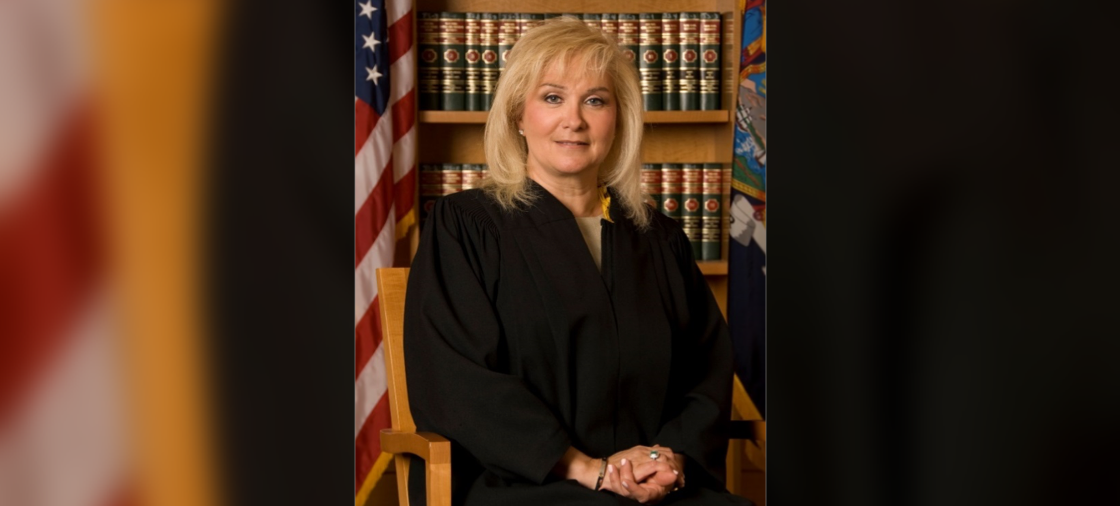 |
|||
| The Hon. Esther M. Morgenstern | |||
Spotlight on: Erie County IDV Court |
||||
| By Sheila Schwanekamp, Esq., IDV Court Attorney Referee | ||||
 |
||||
 Justice Deborah A. Haendiges |
The Erie County Integrated Domestic Violence Court opened in November 2003. Since its inception, the Erie County IDV Court has served over 2,500 families and has handled over 12,250 cases. The Erie County IDV Court began with Justice John F. O’Donnell serving as the Presiding Justice of this full-time IDV Court until December 2005. |
|||
In January 2006, Justice Deborah A. Haendiges was designated as the Erie County IDV Judge where she has been presiding over the past 10 and one half years. Continuity in the Presiding Judge and staffing has been an asset to the Erie County IDV Court. Several members of the Erie IDV Court team, including Justice Haendiges’ Confidential Law Clerk, Ann Boland, Esq., Secretary Patrice Castanza, Court Attorney Referee Sheila Schwanekamp, Esq.; Resource Coordinator Colleen Gibbons, Court Clerk Cathy Hagner, Court Officer Jeff Loga and Court Attendant Paul Guenther have also worked in the IDV Court for 10 years or more. The other Erie IDV Court team members, Court Reporter Sandy Scruggs, Court Clerks Patricia Korzelius, Christine Kibler, Karen Swartwood and Court Officer Brad Egan have all worked with the Erie County IDV Court for an extended period of time as well. Early on in the development of the Erie IDV Court, the Court included in its IDV Planning Document a section on “Children At Risk” to address the social science evidence of the lasting deleterious effect on children who live in a violent home, even if not a direct victim or eyewitness to the violence. Evidence of this research was often an issue that arose in cases before the Erie County IDV Court. One of these cases from Erie County IDV Court was nationally publicized on ABC’s “20/20” and on “The Oprah Winfrey Show.” The defendant was charged with 12 counts of assault, criminal contempt, tampering with a witness and two counts of endangering the welfare of a child. The uniqueness of this case was due to the fact that the defendant father had directed the 14-year-old son to videotape one of the beating sessions of the mother. This videotape was ultimately used as evidence in the criminal trial. Due to the long history of violence in the home, two of the parties’ three children were actually more aligned with the father at the time of trial. After the defendant was convicted of six felony assault charges, Justice O’Donnell sentenced him to 36 years’ incarceration, the harshest sentence imposed in a domestic violence case where there was not a homicide. At sentencing, the judge emphasized the damage that the defendant had done not only to the mother, but to the entire family. Due to the focus of the Erie County IDV Court on the impact of the domestic violence on the entire family, the mother and all of the children received appropriate counseling which ultimately resulted in their reunification. The impact of domestic violence on the entire family has remained a focus of the Erie County IDV Court. Justice Deborah Haendiges has presented the recent evidence-based research on the impact of domestic violence and trauma on children’s neurological brain development at numerous programs for matrimonial and Family Court attorneys, and at the Fourth Department Law Guardian Panel Program addressing the issue of the legal requirements for substitution of judgment in domestic violence cases. Simultaneously, one of the local domestic violence victim service providers, Child and Family Service’s Haven House, has incorporated this important research into their domestic violence counseling in a program called “Parenting After Violence.” This is a trauma-informed, evidence-based program available to parents and children who have experienced or witnessed domestic violence. Justice Haendiges has also presented the IDV Court model to national and international audiences. Justice Haendiges and Judge Bruna DiBiase, former Chief of Staff for Hon. Judy Harris Kluger (retired), the Office for Court Administration, gave a presentation to the Minister of Justice of Canada. Thereafter, a large delegation of Judges and administrators from Ontario, Canada conducted meetings and held a site visit with the Erie County IDV Court prior to opening the first IDV Court in Canada. In 2014, another delegation of judges, law enforcement and legislative representatives from Croatia held a site visit meeting with the Erie County IDV Court to learn about the IDV Court model. Judicial monitoring has been a key focus of the Erie County IDV Court. With the assistance of the IDV Resource Coordinator, Justice Haendiges regularly monitors defendants for compliance with court-mandated programs to meet the goals of complainant safety and offender accountability. Erie IDV Resource Coordinator Colleen Gibbons also has been very proactive in providing domestic violence training to mental health and substance abuse service providers who have been conducting evaluations and providing counseling to litigants in the IDV Court. When she learned that most of the social workers and counselors providing these services did not have any educational background on domestic violence, she contacted the supervisors of these agencies and has been regularly providing this training for the agencies. One of the first successfully prosecuted marital rape cases was before the Erie County IDV Court and was also nationally publicized on “The Oprah Winfrey Show.” The defendant was convicted in 2006 and sentenced by Justice Haendiges in 2006 to a lengthy period of incarceration. Since its inception, the Erie County IDV Court has had strong community support from many local stakeholders. On-site victim services are regularly available to complainants and Family Court or matrimonial litigants in the IDV Court. The local legal services agencies developed a panel of attorneys who were cross-trained in criminal and civil matters. This program has streamlined valuable resources and also provides continuity to litigants who may have one attorney representing them on both the criminal and civil matters. There has been a dedicated Assistant District Attorney for the IDV Court. The IDV Court has also maintained strong contacts with the University at Buffalo Law School which regularly has students observe the IDV Court and learn about its mission and goals. Some law school students participating in the U.B. Law Clinical Studies Program have also worked with their instructor to provide representation to domestic violence litigants in the IDV Court. “With the assistance of the IDV Resource Coordinator, Justice Haendiges regularly monitors defendants for compliance with court-mandated programs to meet the goals of complainant safety and offender accountability.” Sheila Schwanekamp, Esq., The Erie County IDV Court team also regularly attends the OCA trainings dealing with recent issues concerning domestic violence and brings this information back to the local courts and community. After attending the OCA Judicial Conference on Domestic Violence presentation on risk assessments, in my capacity as the 8th JD IDV Project Coordinator, I was interested in how these assessments might be adapted for the court system. With the support of 8th JD Administrative Judge Paula Feroleto, the Office for Court Administration, and the Center for Court Innovation, the 8th JD assembled a team of judges and court attorney referees for a pilot project on risk assessment. Justice Haendiges and I were involved with the pilot, which culminated in the N.Y.S. Judicial Guide to Risk Assessment in Domestic Violence Cases. |
|||
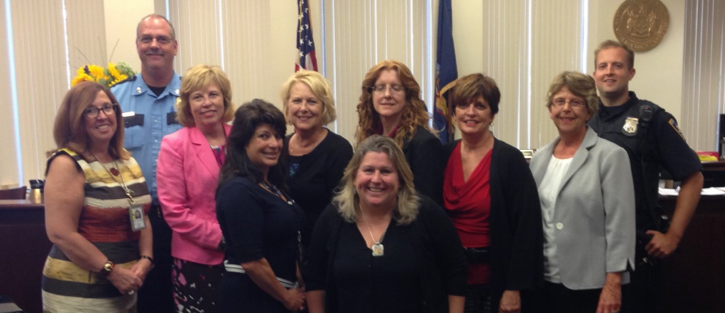 |
|||
| Erie County IDV Court Team, Left to Right: Sheila Schwanekamp, Esq., IDV Court Attorney Referee; Paul Guenther, IDV Court Attendant; Ann Boland, Esq., Confidential Law Clerk to Justice Haendiges; Patrice Castanza, Secretary to Justice Haendiges; Hon. Deborah A. Haendiges, Erie IDV Court Presiding Judge; Patricia Korzelius, IDV Court Clerk; Christine Kibler, IDV Court Clerk; Colleen Gibbons, IDV Resource Coordinator; Cathy Hagner, IDV Court Clerk; Jeff Loga, IDV Court Officer. | |||
The Erie County IDV Court team is extremely dedicated as evidenced by the longevity of the team. Everyone is committed to helping families in crisis. In recognition of the impact of dealing with these very serious cases on a full-time basis, the members of the Erie IDV team have received training on vicarious trauma and have also participated in trainings on domestic violence dynamics. Justice Haendiges notes that the Erie IDV team members have all indicated that these programs have helped them better perform their specific roles in the IDV Court. The dedication of Justice Haendiges and the Erie County IDV Court team is the reason for the success of this very busy court which has had such an important impact on the lives of domestic violence survivors and their children. |
|||
The New York State Judicial Committee on Elder Justice is now a Standing Advisory Committee of the New York State Courts |
||
As Statewide Coordinating Judge for the OFVC, Justice Kaplan seeks to improve how the court system addresses the growing number of cases involving the state’s older population. Toward that end, she has met with more than 250 stakeholders, including but not limited to police departments, Department for the Aging Officials, Adult Protective Services, various prosecutors from the district attorneys’ offices from around the state and the Attorney General’s office which handle elder abuse matters, representatives from a number of legal services agencies from around the state, other members of the Bar, representatives from JASA, The Harry and Jeannette Weinberg Center for Elder Abuse Prevention, LiveON NY, Brookdale Center for Healthy Aging and clinical law professors who handle issues involving older litigants. There has been an overwhelming expression of welcome and appreciation among these many groups that the Court system has affirmatively entered the conversation in this area. Justice Kaplan then convened an Elder Justice Working Group which, pursuant to Administrative Order of Chief Administrative Judge Lawrence K. Marks dated December 1, 2015 is now a standing committee of the courts – The NYS Judicial Committee on Elder Justice. The committee had its first meeting in September 2015, after which subcommittees were created, and goals and a timetable for accomplishing them were set. The subcommittees are as follows: Community Outreach, Education, Interagency Coordination, Legislative Initiatives, Policy and Procedures and Technology, Research and Data Collection. The second committee meeting was held in February 2016 and the third meeting is scheduled for October 2016. |
|||
NYS Judicial Committee |
||||
Chair Captain Isa Abbassi Robert Abrams, MD Hon. Ralph A. Boniello, III Niagara County Supreme Court Risa Breckman, LCSW Jean Callahan, Esq., MSW Amy Chalfy Catherine A. Christian, Esq. Andrea Cianfrani, Esq. John Cochran Hon. Matthew D’Emic Donna Dougherty, Esq. Hon. Paula L. Feroleto Professor Ann L. Goldweber Fredric I. Green, Esq. Heather Parker Hines, Esq. Lieutenant Charles Hollon Deputy Chief Juanita Holmes Deborah Holt-Knight Elizabeth Hooks Peg Horan, LMSW Matt Kudish, LMSW Hon. Dean Kusakabe Mark Lachs, M.D. Cheryl Lee |
Joan G. Levenson, Esq. Elizabeth Loewy, Esq. Ronnie LoFaso, MD Deirdre Lok, Esq. Deanna J. Lucci, Esq. Arlene M. Markarian, Esq. Art Mason, LMSW Robyn Mazur, Esq. Jody B. Miller Kerry C. Mills Karen L. Nicolson, Esq. Russell Nislow Thomas O’Hanlon, Esq. Martha H. Pollack, LCSW-R Vera Prosper, Ph.D. Erin Purcell Jennifer Rosenbaum Laura Russell, Esq. Bobbie Sackman Aurora Salamone Steven A. Schurkman, Esq. Joy Solomon, Esq. Audrey E. Stone, Esq. Hon. Milton A. Tingling Charlotte A. Watson |
|||
The OFVC Commemorates World Elder Abuse Awareness Day on June 15, 2016 |
||
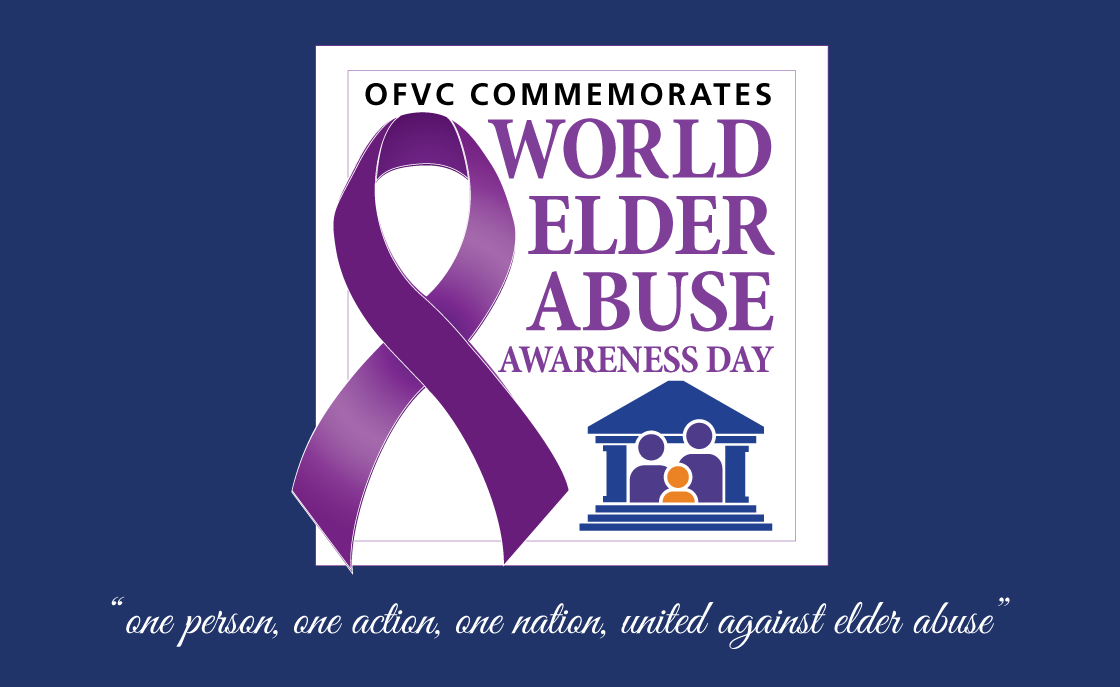 |
||
Judge Kaplan and the OFVC commemorated World Elder Abuse Awareness Day (WEAAD), which is an annual event that raises awareness about elder abuse and neglect in our community. The International Network for the Prevention of Elder Abuse and the World Health Organization at the United Nations (UN) launched the first World Elder Abuse Awareness Day (WEAAD) on June 15, 2006 in an effort to unite communities around the world in raising awareness about elder abuse. Many organizations sponsored WEAAD events in New York City and around New York State, some of whom have staff members who sit on the NYS Judicial Committee on Elder Justice, a committee convened by Justice Kaplan. On the OFVC website we have a listing of many WEAAD events and campaigns that were held around the state. The OFVC participated in the following WEAAD events:
For general information about WEAAD, click here for NCEA Administration on Aging World Elder Abuse Awareness Day page and here for the National Resource Center on Domestic Violence Special Announcement regarding WEAAD 2016. |
|||
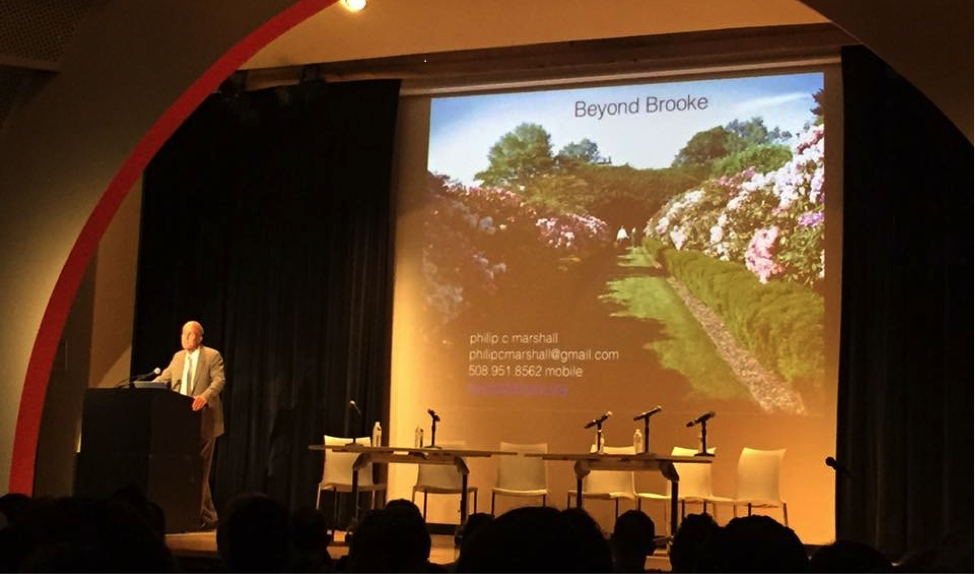 |
|||
| Brooke Astor’s grandson, Philip C. Marshall, delivers the keynote address at the NYC Elder Abuse Conference on June 15, 2016 | |||
An Elder Abuse Presentation for Judges and Court Personnel in Syracuse |
||
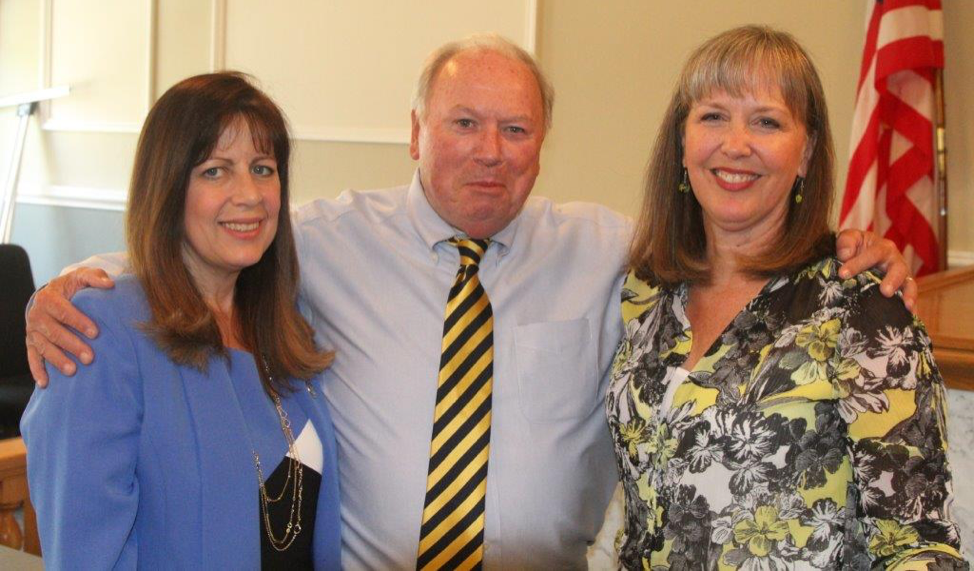 |
||
| From left: Justice Deborah A. Kaplan, Statewide Coordinating Judge for Family Violence Cases, The Hon. James C. Tormey, III, Administrative Judge, 5th Judicial District, and Jenny Hicks, Project Coordinator, Abuse in Later Life Grant, Vera House, Inc. | ||
On June 23, 2016, Judge Kaplan participated in an Elder Abuse Presentation for Judges and Court Personnel at the Onondaga County Courthouse in Syracuse, NY. Approximately 50 judges, court managers and personnel attended the presentation in person and another 25 viewed the presentation via Skype. The Hon. Deborah Kaplan, Statewide Coordinating Judge for Family Violence Cases, and the Hon. James C. Tormey, Fifth Judicial District Administrative Judge, spoke at the training, which was conducted by Vera House, Inc. Onondaga County, with Vera House, Inc. as the lead organization, was among nine communities nationwide to receive a highly competitive three-year “Abuse in Later Life Grant” from the Office on Violence Against Women. One of the goals of the grant is to offer training about the issues of Elder Abuse, Neglect and Financial Exploitation. Elder abuse includes physical, emotional and sexual abuse, caregiver neglect and financial exploitation. Attendees of the program were informed about the prevalence and cost of elder abuse, types of elder abuse, indicators of abuse, traits of victims, common perpetrators and available community resources. It was noted that the elderly are more at risk because they are often isolated, dependent on others and fear what could happen if they report the abuse. A recent study provided that approximately 14 percent of people over 60 years old in New York State have reported being abused. It is estimated that financial exploitation costs victims and the State 1.5 billion dollars each year and that the overwhelming majority of those cases are never reported. “A recent study provided that approximately 14 percent of people over 60 years old in New York State have reported being abused. It is estimated that financial exploitation costs victims and the State 1.5 billion dollars each year and that the overwhelming majority of those cases are never reported.” Michael A. Klein, Esq., District Executive, Fifth Judicial District Jenny Hicks, Project Coordinator for the Abuse in Later Life Grant, stated that elder abuse can occur anywhere and most often goes undetected at home. Elder abuse is a societal problem, which occurs most often at the hands of family, friends, neighbors, and caregivers of the elderly. Judge Tormey expressed his appreciation to Vera House for providing this important information to the judges and court personnel in the Fifth Judicial District. At the event, Judge Kaplan gave a presentation about the work of the OFVC and discussed what steps the office has taken to improve how the court system addresses the growing number of cases involving the state’s older population. You can also read about the presentation on Vera House’s website here. |
|||
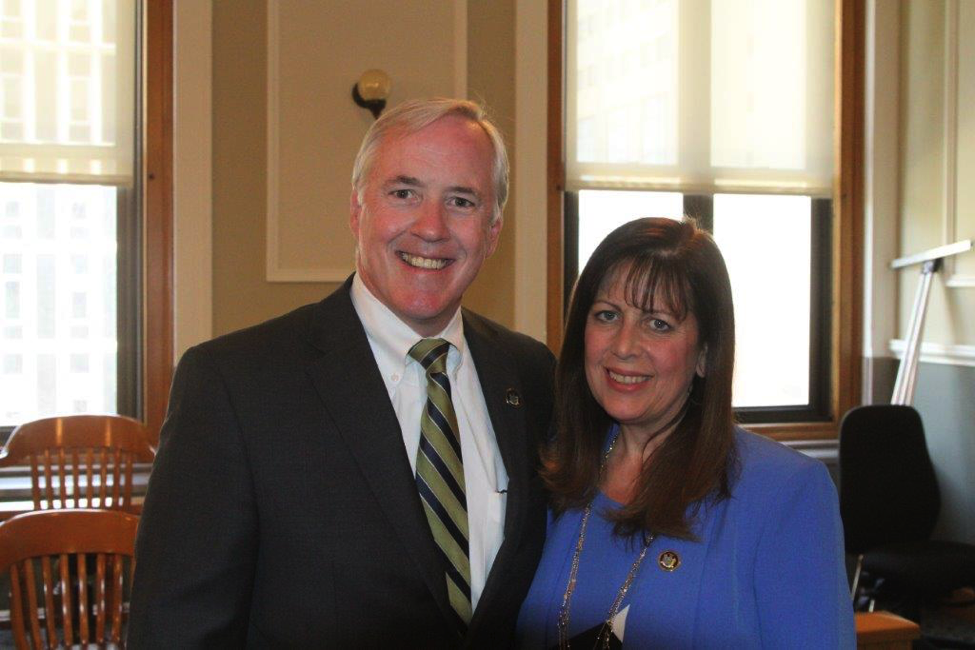 |
|||
| Hon. Stephen Dougherty, Supervising City Court Judge, Syracuse City Court, with Judge Kaplan | |||
Acid attack survivor and social activist MoniCa Singh speaks at Women’s History Month Celebration |
||
 |
||
| MoniCa Singh addresses the audience | ||
The Gender Fairness Committee, New York County, Supreme Court, Civil Branch, hosted its annual Women’s History Month Celebration on April 14, 2016 at the Supreme Court, New York County, Civil Term. This year, the Committee, which hosts several widely recognized and commended public outreach programs, welcomed MoniCa Singh, a motivational speaker, humanitarian, and social activist. The Committee also presented the 2016 Women’s History Month Distinguished Service Award to Madeline Young, a beloved employee of the Supreme Court, New York County, Civil Branch. Over 100 guests, which included judges, attorneys, judicial and non-judicial employees, leaders of non-profit organizations, professors, and students, attended the event which was hosted in the historic Ceremonial Courtroom located at 60 Centre Street in Manhattan. The attendees were welcomed by the Honorable Peter H. Moulton, Administrative Judge For Civil Matters, First Judicial District. Judge Moulton thanked the Committee for hosting a program on such an important subject matter, and congratulated both Ms. Singh as well as Ms. Young for their respective work. The Honorable Deborah A. Kaplan, Statewide Coordinating Judge for Family Violence Cases and Co-Chairperson of the Gender Fairness Committee, Supreme Court, New York County, Civil Branch, introduced Ms. Singh. Judge Kaplan, who works with administrative judges and judges as well as non-judicial personnel across the state who sit in New York State’s Domestic Violence courts and Integrated Domestic Violence courts, discussed the courts’ critical role in addressing cases involving gender based violence and domestic violence. Judge Kaplan discussed Ms. Singh’s accomplishments including her recent participation at the UN International Women’s Day 2016 Observance. Following Judge Kaplan’s introduction, Ms. Singh shared with the audience her powerful personal journey. After suffering an acid attack which caused her to undergo multiple surgeries and endure a long recovery period, Ms. Singh discussed how she transformed the pain from that event into a mission to educate and inspire others. She has become an advocate for the prevention of gender based violence and human rights and now regularly lectures on such important topics. Ms. Singh shared with the attendees how, following the death of her father, she launched The Mahendra Singh Foundation, a not-for-profit organization, which was named in his honor. Ms. Singh explained how the organization aims to honor her father’s memory and his messages to her of hope and the importance of continuing her education. Her foundation works on the sustainable developmental goal of quality education and gender equality, and Ms. Singh’s dream is to provide underprivileged girls and women with skills to work in any field which they choose to pursue. “After suffering an acid attack which caused her to undergo multiple surgeries and endure a long recovery period, Ms. Singh discussed how she transformed the pain from that event into a mission to educate and inspire others.” Gregory Testa, Esq., Along with her social activism, Ms. Singh is a fashion design graduate of The National Institute of Fashion Technology, New Delhi, India. Ms. Singh shared with the audience how during her recovery process, she dreamed of continuing her education to obtain a graduate degree in fashion. She worked at accomplishing this goal and was thrilled to be accepted to Parsons School of Design. Following several years of hard work, Ms. Singh looks forward to graduating this spring. John Werner, Esq., Chief Clerk of the Supreme Court, New York County, Civil Branch, presented the Women’s History Month Distinguished Service Award to Madeline Young of the Supreme Court, New York County, Civil Branch. This award is annually given to an employee who has provided outstanding service to the courts. Ms. Young has worked at the court system since 1990 and now works as a Principal Court Analyst in the Administrative Office of the Supreme Court, Civil Branch, New York County. Ms. Young graciously accepted her award and thanked her many co-workers for their assistance through the years. Gregory Testa, Esq., a Court Attorney with the Law Department, Supreme Court, New York County, Civil Term, and Co-Chairperson of the event, provided closing remarks and congratulated both Ms. Singh and Ms. Young for their inspiring work and thanked the court community for their support of this annual tradition. Following the program, guests were able to meet and congratulate both honorees at a reception. |
||
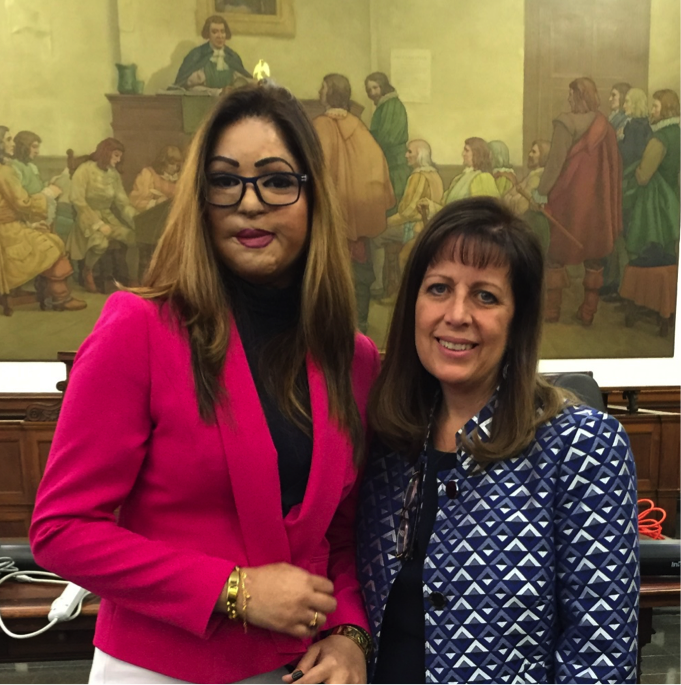 |
||
| MoniCa Singh with Judge Kaplan | ||
Judge Kaplan was recently featured on the NY Courts Amici PodcastClick below to listen |
||
 |
|||
She was interviewed by John Caher, and discussed her new role as Statewide Coordinating Judge for Family Violence Cases and the work of the OFVC. |
|||
Judge Kaplan and Charlotte Watson participate in Practising Law Institute’s (PLI) continuing legal education webinar, “Addressing Domestic Violence Across Practice Areas 2016” |
||
 |
||
| (photos courtesy of PLI): Charlotte A. Watson delivers the opening message on behalf of the Hon. Betty Weinberg Ellerin, Chair, Women in the Courts Committee | ||
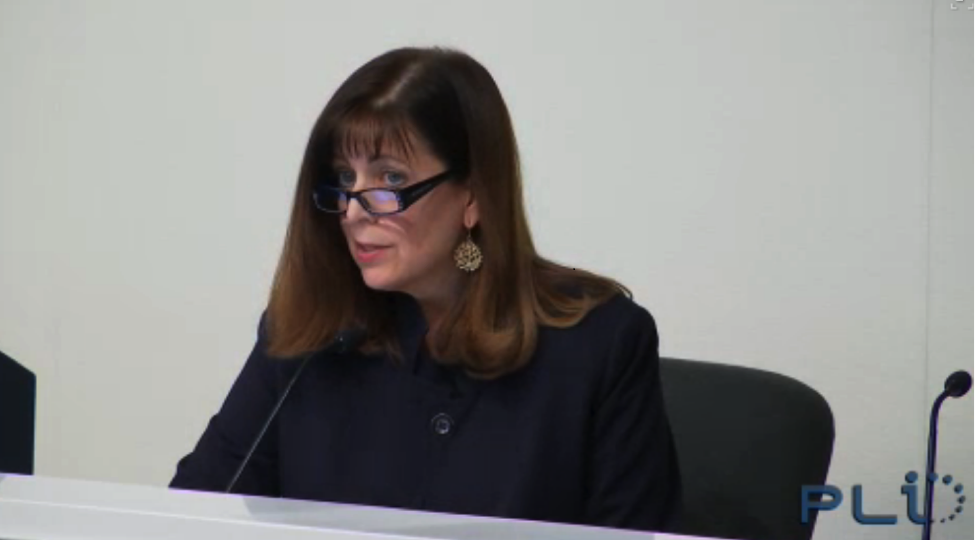 |
||
Judge Kaplan moderates a panel discussion, “The Expert Witness.”
|
||
 |
||
“The Expert Witness” panel, from left: Justice Deborah A. Kaplan, Dorchen A. Leidholdt, Esq., Carmen M. Rey, Esq., Kim Susser, Esq. and Dr. Luz Towns-Miranda |
||
To view the webinar, click here: To read an article about the webinar, click here: |
||
20th Annual Fordham Forum on Domestic Violence:
Two Reports from the Conference |
||
The Twentieth Annual Fordham Forum on Domestic Violence was held May 9-10, 2016 at Fordham Law School. The title was “Milestones, Roadblocks, and the Journey Forward.” Co-sponsors included Fordham Law School Feerick Center for Social Justice, the Lawyers Committee Against Domestic Violence, New York State Judicial Committee on Women in the Courts, New York State Office of the Statewide Coordinating Judge for Family Violence Cases (OFVC), and the New York Women’s Bar Association. Topics addressed included a look back over the accomplishments of the battered women’s movement and government in addressing domestic violence, child welfare and parental rights including achievements and challenges post Nicholson v. Scoppetta, new approaches to intimate partner violence through specialized courts, collaborating with mental health professionals when representing victims of intimate partner violence, an examination of criminal justice responses to intimate partner violence, and serving transgender and gender non-conforming survivors. Each year, the Lawyers Committee Against Domestic Violence bestows the “In the Trenches” award recognizing “indomitable courage, vision and dedication to ending intimate partner violence.” The award is presented to one person from the advocacy community and one from government through a nomination and selection process held by the Lawyers Committee Against Domestic Violence. This year, the advocacy award was presented to Maribel Martinez-Gunter from Manhattan Legal Services. The government award was presented to the Honorable Tandra L. Dawson, who serves as the Integrated Domestic Violence Court judge in New York County. Judge Dawson was nominated for the award by Sanctuary for Families. The award was presented to Judge Dawson by Justice Deborah Kaplan, Statewide Coordinating Judge for Family Violence Cases. The Fordham Forum was very well attended, including more than 30 people from the Unified Court System. A reception was held at the conclusion of the first day to recognize the 20th anniversary of the conference. The second day began with a brief video featuring several people who had been instrumental in creating and developing the Fordham Forum in the early days. This was followed by a review of the rich history of the conference presented by Catherine Douglass, former co-chair of the Lawyers Committee Against Domestic Violence and founder of Her Justice. |
20th Annual Fordham Forum on Domestic Violence:
Two Reports from the Conference |
||
On May 9th and 10th, 2016, the Fordham University School of Law hosted the 20th Annual Fordham Conference on Domestic Violence, co-sponsored by the Lawyers Committee Against Domestic Violence, Feerick Center for Social Justice, the New York State Judicial Committee on Women in the Courts, New York State Office of the Statewide Coordinating Judge for Family Violence Cases, and the New York Women’s Bar Association. The conference aims to educate participants about the evolution of the legal response to domestic violence, provide skills to more effectively litigate domestic violence cases, and to explore innovative approaches to help end domestic violence. The 2016 conference, Milestones, Roadblocks, and the Journey Forward, provided participants an opportunity to reflect upon the progress made within the movement to end domestic violence during the past 20 years of the conference, and to consider how to further prevent, respond, and hopefully eliminate domestic violence in the future. The Fordham Conference, which was initiated by a handful of legal service attorneys with a goal of strengthening domestic violence legal advocacy, has become a fixture in New York. Each year, hundreds of participants and panelists come together from throughout New York to explore emerging issues and to learn practical legal skills. For the 20th anniversary, the organizing committee selected two visionary keynote speakers, Gwen Wright and Lynn Rosenthal, to share their experiences of working to end domestic violence. Ms. Wright is the Executive Director of the New York State Office for the Prevention of Domestic Violence (OPDV) and a luminary in the New York State movement to end domestic violence. Lynn Rosenthal focused on the national movement while sharing her experiences as a White House Advisor on Violence Against Women and within her current role as Vice President at the National Domestic Violence Hotline. Instead of a traditional speech format, the keynote address was a conversation in which the moderators and speakers shared their victories, roadblocks, and the deeply personal stories that led the speakers to commit their lives to ending domestic violence. |
||
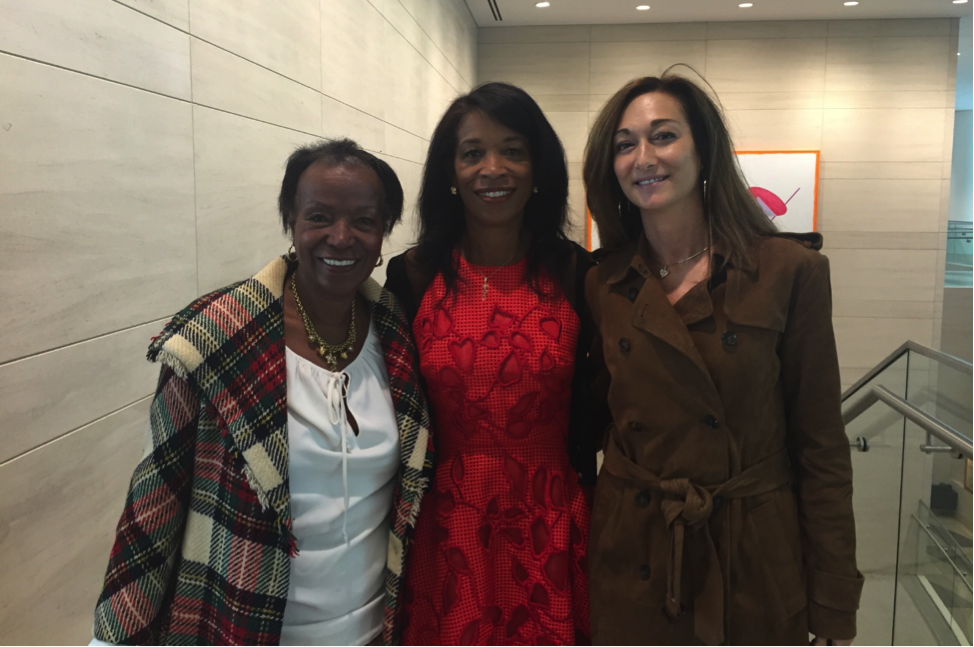 |
||
| Judge Tandra Dawson, center, poses with her mother, Dr. Joan O. Dawson, and her Principal Court Attorney, Linda Capitti, Esq., after receiving the In the Trenches award | ||
The remainder of the two-day conference was comprised of five topic areas, including an exploration of the landmark case Nicholson v. Scoppetta. The conference oscillated between broad topics such as the criminal justice response to domestic violence and more narrowly defined topics like how to improve services for survivors who are transgender or gender non-conforming. Two panels specifically looked at changes in the court system. The first panel assessed the increased role of mental health professionals in the court system. The second considered the rise of specialized courts, like the Integrated Domestic Violence and human trafficking parts, and the role of these courts in better serving the unique needs of survivors of gender-based violence. “What was clear from looking at the different views of our hard-fought history is that the journey to end domestic violence requires collaboration between a variety of social, legal, and legislative systems that help survivors to traverse roadblocks and to access resources that will help them to find safety.” Ian B. Harris, Esq., Director, Family Law Unit at Staten Island Legal Services, Fordham Conference Co-Chair Two individuals were given the In the Trenches Awards in recognition of their longstanding commitment to the fight against domestic violence. One award is given to an advocate who is representing survivors of domestic violence, while the other award focuses on individuals who are assisting survivors of domestic violence from an institutional role. This year, the institutional award was given to Judge Tandra Dawson, of the Manhattan Integrated Domestic Violence part. Justice Deborah Kaplan, the Statewide Coordinating Judge for Family Violence Cases, presented the award to Judge Dawson, who delivered a moving speech which included appreciation for her mother, Dr. Joan O. Dawson, who also attended the ceremony. The conference included participants from private law firms, legal services, assigned counsel panels, academia, government, and the judiciary. With so many different vantage points, there was not always agreement about the history or the future of the movement to end domestic violence. It was those disagreements, however, that led to a deepening of the movement in the last 20 years and will continue to lead to improvements in the law and in legal practice for the foreseeable future. What was clear from looking at the different views of our hard-fought history is that the journey to end domestic violence requires collaboration between a variety of social, legal, and legislative systems that help survivors to traverse roadblocks and to access resources that will help them to find safety. The Fordham conference gave a chance for participants to examine the benefits and drawbacks of the systems that have been built and to consider what systems may look like in the next 20 years. |
||
Firearms and Domestic Violence |
||
|
Having a gun in the home increases the risk of homicide 20 times when there is a history of domestic violence. At every stage of a proceeding from issuance of temporary orders of protection to sentencing courts must consider the presence of weapons in a home. Yet, few topics create more confusion for courts than compliance with laws regarding the surrender of firearms and revocation or suspension of licenses in domestic violence cases. To assist courts in producing effective protocols and strategies the Office of Family Violence Cases (OFVC) is working closely with districts throughout the state. “Having a gun in the home increases the risk of homicide 20 times when there is a history of domestic violence.” Audrey E. Stone, Esq., Special Counsel to the OFVC Over the past two months our office conducted a detailed analysis of the issues impacting the surrender of weapons and the regulation of firearm licenses. Our research led us to better identify gaps in procedure that are common across the state. We joined a New York City firearms working group led by the Center for Court Innovation. This working group of government and agency stakeholders meets regularly to address domestic violence firearm issues in New York City. Elsewhere in the state we are actively engaged in helping districts develop written protocols that provide judges from town, villages and cities as well as family, county and supreme courts to effectively monitor weapon surrenders and modifications to licenses. On the training front, we produced a CLE on firearms and domestic violence that is now available throughout the court system online. Court users can click here to view the CLE video. Judge Kaplan moderated the program with Ellen Schell, General Counsel at the New York State Office for the Prevention of Domestic Violence. The CLE covers a broad range of topics: an overview of the statutes governing firearms, including the New York SAFE Act and relevant federal statutes, the interplay of orders of protection and firearm surrenders and license suspensions, the legal impediments to returning firearms and useful best practice tips for judges. We also conducted training for the Family Court judges and court attorneys in the 9th Judicial District and are planning follow-up live sessions this fall. |
|||
IDV Case File Folders Have Been Updated! |
||
| By Charlotte A. Watson | ||
The new IDV Case File Folder: |
||
 |
||
The OFVC worked with The Hon. Andrew Crecca, Suffolk County IDV, Principal Court Clerk Denise Mirante, The Hon. Tandra Dawson, New York County IDV, Associate Court Clerk Gail Fleming, Erie County DV Coordinator and Court Attorney Referee Sheila Schwanekamp, and Ninth Judicial District Liaison Betty Campbell to update the IDV Case File Folder to make it more user friendly. If your IDV court needs a replenishment of these folders, please email Michelle Furey with the number of folders requested and a shipping address including a contact and phone number. To view the new folder jacket as a PDF, click here. To stay up to date on the OFVC, please visit our website at http://www.nycourts.gov/courts/family-violence/index.shtml |
|||
The OFVC would like to thank Lucian Chalfen, Public Information Director, Arlene Hackel, Deputy Director, Communications Office, and Nick Inverso and Cathleen McDonald of the Graphics Unit for their invaluable assistance with this newsletter. |
|||
 |